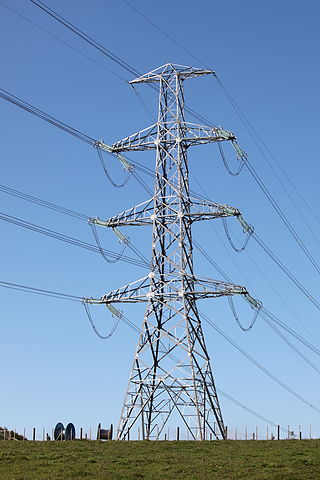Related Research Articles

A chatbot is a software application or web interface designed to have textual or spoken conversations. Modern chatbots are typically online and use generative artificial intelligence systems that are capable of maintaining a conversation with a user in natural language and simulating the way a human would behave as a conversational partner. Such chatbots often use deep learning and natural language processing, but simpler chatbots have existed for decades.

Electric power distribution is the final stage in the delivery of electricity. Electricity is carried from the transmission system to individual consumers. Distribution substations connect to the transmission system and lower the transmission voltage to medium voltage ranging between 2 kV and 33 kV with the use of transformers. Primary distribution lines carry this medium voltage power to distribution transformers located near the customer's premises. Distribution transformers again lower the voltage to the utilization voltage used by lighting, industrial equipment and household appliances. Often several customers are supplied from one transformer through secondary distribution lines. Commercial and residential customers are connected to the secondary distribution lines through service drops. Customers demanding a much larger amount of power may be connected directly to the primary distribution level or the subtransmission level.

The electric power industry covers the generation, transmission, distribution and sale of electric power to the general public and industry. The commercial distribution of electric power started in 1882 when electricity was produced for electric lighting. In the 1880s and 1890s, growing economic and safety concerns lead to the regulation of the industry. What was once an expensive novelty limited to the most densely populated areas, reliable and economical electric power has become an essential aspect for normal operation of all elements of developed economies.

TXU Energy is an American retail electricity provider headquartered in Irving, Texas, serving residential and business customers in deregulated regions of Texas since the deregulation of the Texas electricity market in 2002. A subsidiary of Vistra Corp, it is one of the largest retail electricity providers in Texas.

Scottish Power Limited, trading as ScottishPower, is a vertically integrated energy company based in Glasgow, Scotland. It is a subsidiary of Spanish utility firm Iberdrola.

Emera Incorporated is a publicly traded Canadian multinational energy holding company based in Halifax, Nova Scotia. Created in 1998 during the privatization of Nova Scotia Power, a provincial Crown corporation, Emera now invests in regulated electricity generation as well as transmission and distribution across North America and the Caribbean.
Commonwealth Edison, commonly known by syllabic abbreviation as ComEd, is the largest electric utility in Illinois, and the primary electric provider in Chicago and much of Northern Illinois. Its service territory stretches roughly from Iroquois County on the south to the Wisconsin border on the north and from the Iowa border on the west to the Indiana border on the east. For more than 100 years, Commonwealth Edison has been the primary electric delivery services company for Northern Illinois. Today, ComEd is a unit of Chicago-based Exelon Corporation, one of the nation's largest electric and gas utility holding companies. ComEd provides electric service to more than 3.8 million customers across Northern Illinois. The company's revenues totaled more than $7 billion in 2023.
National Grid plc is a British multinational electricity and gas utility company headquartered in London, England. Its principal activities are in the United Kingdom, where it owns and operates electricity and natural gas transmission networks, and in the Northeastern United States, where as well as operating transmission networks, the company produces and supplies electricity and gas, providing both to customers in New York and Massachusetts.

Vector Limited is a New Zealand energy company, which runs a portfolio of businesses delivering energy and communication services across Australasia and the Pacific. Its primary business is electricity distribution, along with distributing piped gas. It also has a bottled gas business, owns a fibre optic cable network, deploys electricity and gas meters, manages solar infrastructure projects and offers cybersecurity services and a data platform. It is also the parent company of HRV ventilation solutions.
The Power Holding Company of Nigeria (PHCN), formerly the National Electric Power Authority (NEPA), was a power company owned by the government of Nigeria. It represented Nigeria in the West African Power Pool. During the era when it operated as NEPA, the company managed a football team, NEPA Lagos.
A virtual power plant (VPP) is a system that integrates multiple, possibly heterogeneous, power resources to provide grid power. A VPP typically sells its output to an electric utility. VPPs allow energy resources that are individually too small to be of interest to a utility to aggregate and market their power. As of 2024, VPPs operated in the United States, Europe, and Australia.

Hrvatska elektroprivreda is a national power company in Croatia which has been engaged in electricity production, transmission and distribution for more than one century, and with heat supply and gas distribution for the past few decades. HEP Group is organized in the form of a holding company with a number of daughter companies.

El Paso Electric is a Texas-based public utility company, engaging in the generation, transmission, and distribution of electricity in west Texas and southern New Mexico. Its energy sources consist of nuclear fuel, natural gas, purchased power, solar and wind turbines. The company owns six electrical generating facilities with a net dependable generating capability of approximately 2,010 megawatts. It serves approximately 437,000 residential, commercial, industrial, public authority, and wholesale customers.
An electric utility, or a power company, is a company in the electric power industry that engages in electricity generation and distribution of electricity for sale generally in a regulated market. The electrical utility industry is a major provider of energy in most countries.
Vermont electric power needs are served by over twenty utilities. The largest is Green Mountain Power, a subsidiary of Énergir which recently also took over Central Vermont Public Service. Together this single company represents 70% of the retail customers in Vermont. The state is a small electricity consumer compared with other states. Therefore, its electricity sector has the lowest carbon footprint in the country. As of 2010, the state had the lowest wholesale electricity costs in New England. Efficiency Vermont engages in aggressive initiatives to cut residential electricity waste, which often identifies other problems that it claims can save hundreds per household per year. Accordingly, Vermont's overall energy bills are also relatively lower than in the rest of the New England states.

West Bengal State Electricity Distribution Company Limited (WBSEDCL) is a wholly owned enterprise of Government of West Bengal, established in 2007 as one of the two successors of West Bengal State Electricity Board, and is responsible for providing power to 96% of West Bengal with a customer base of more than 2.2 crore across the state. The company has achieved a profit of ₹95.13 crore (PAT) in the fiscal year 2010–11.
The electricity sector in Nigeria generates, transmits and distributes megawatts(MW) of electric power that is significantly less than what is needed to meet basic household and industrial needs. Nigeria has twenty-three (23) power-generating plants connected to the national grid with the capacity to generate 11,165.4 MW of electricity. These plants are managed by generation companies (GenCos), independent power providers, and Niger Delta Holding Company. In 2012, the industry labored to distribute 5,000 MW, very much less than the 40,000 MW needed to sustain the basic needs of the population. This deficit is also exacerbated by unannounced load shedding, partial and total system collapse and power failure. To meet demand, many households and businesses resort to purchasing generating sets to power their properties; this source of energy provided 6,000 MW in 2008. Nigeria has a chronic electricity shortage that has affected the country for many years. In 2022, its power grid collapsed twice in one week.
Electric Kiwi is an independent online New Zealand electricity retailer.

Haptik is an Indian enterprise conversational AI platform founded in August 2013, and acquired by Reliance Industries Limited in 2019. The company develops technology to enable enterprises to build conversational AI systems that allow users to converse with applications and electronic devices in free-format, natural language, using speech or text. The company has been accorded numerous accolades including the Frost & Sullivan Award, NASSCOM's Al Game Changer Award, and serves Fortune 500 brands globally in industries such as financial, insurance, healthcare, technology and communications.
Kola Adesina is a Nigerian entrepreneur, managing director of Sahara Group, former chairman of Egbin Power Plc, and board chairman of Ikeja Electric.
References
- ↑ "Nigeria's largest power distribution network | Nigeria Electricity". www.nigeriaelectricityhub.com. Retrieved 2016-09-20.
- ↑ "About IE". Ikeja Electric. Retrieved 2025-01-15.
- ↑ "Compensation and Benefits Supervisor at Ikeja Electricity Distribution Company (IKEDC) - INFORMATION NIGERIA". 4 June 2016. Retrieved 2016-09-20.
- ↑ iedisco (2020-08-18). "Ikeja Electric Launches WhatsApp Chatbot to Optimise Service delivery, Complaints Resolution". Ikeja Electric. Retrieved 2021-02-08.